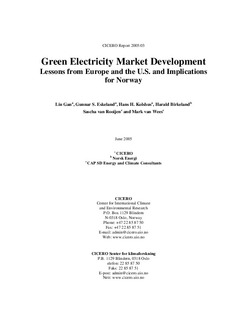Green Electricity Market Development: Lessons from Europe and the U.S. and Implications for Norway
Gan, Lin; Eskeland, Gunnar S.; Kolshus, Hans H.; Birkeland, Harald; van Rooijen, Sascha; van Wees, Mark
Abstract
Various approaches to promoting green electricity were analyzed through the cases of Germany, the Netherlands, Sweden and the United States. How has green electricity market penetration evolved, and what were the main driving forces? The findings from the case studies are synthesized and analyzed with respect to their relevance for Norway, particularly in terms of energy resources, production, potential, relevant policies and barriers. Potential policy instruments for Norway include feed-in tariffs, green certificates under quota obligations, and subsidies for research and development, and are discussed in terms of their strengths and weaknesses. The report argues that to assist technologies feasible today – such as wind power – a choice must be made between green certificates based on obligatory quotas and a feed-in tariff system. Both effectively tax non-green electricity to subsidize green electricity. As shown by the German case study, feed-in tariffs have advantages in terms of effectiveness, providing a suitable investment climate, flexibility and ease of administration. Sweden has a system of green electricity certificates, and if EU also goes in this direction, this will provide an opposing argument, in favor of green certificates. The report concludes that a clear and consistent policy design is crucial, regardless of the particular instruments chosen. It also argues that there is a role for R&D support to help the technologies of the future.
